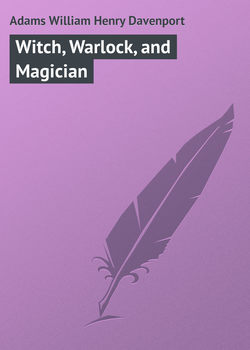Witch, Warlock, and Magician

Реклама. ООО «ЛитРес», ИНН: 7719571260.
Оглавление
Adams William Henry Davenport. Witch, Warlock, and Magician
INTRODUCTION
BOOK I. THE ENGLISH MAGICIANS
CHAPTER I. ROGER BACON: THE TRUE AND THE LEGENDARY
CHAPTER II. THE STORY OF DR. JOHN DEE
CHAPTER III. DR. DEE’S DIARY
CHAPTER IV. MAGIC AND IMPOSTURE – A COUPLE OF KNAVES
CHAPTER V. THE LAST OF THE ENGLISH MAGICIANS: WILLIAM LILLY
CHAPTER VI. ENGLISH ROSICRUCIANS
BOOK II. WITCHES AND WITCHCRAFT
CHAPTER I. EARLY HISTORY OF WITCHCRAFT IN ENGLAND
CHAPTER II. WITCHCRAFT IN ENGLAND IN THE 17TH CENTURY
CHAPTER III. THE DECLINE OF WITCHCRAFT IN ENGLAND
CHAPTER IV. THE WITCHES OF SCOTLAND
CHAPTER V. THE LITERATURE OF WITCHCRAFT
Отрывок из книги
The word χημεια – from which we derive our English word ‘chemistry’ – first occurs, it is said, in the Lexicon of Suidas, a Greek writer who flourished in the eleventh century. Here is his definition of it:
Some authorities assert, however, that this art, or pretended art, is of much greater antiquity than Suidas knew of; and Scaliger refers to a Greek manuscript by Zozomen, of the fifth century, which is entitled ‘A Faithful Description of the Secret and Divine Art of Making Gold and Silver.’ We may assume that as soon as mankind had begun to set an artificial value upon these metals, and had acquired some knowledge of chemical elements, their combinations and permutations, they would entertain a desire to multiply them in measureless quantities. Dr. Shaw speaks of no fewer than eighty-nine ancient manuscripts, scattered through the European libraries, which are all occupied with ‘the chemical art,’ or ‘the holy art,’ or, as it is sometimes called, ‘the philosopher’s stone’; and a fair conclusion seems to be that ‘between the fifth century and the taking of Constantinople in the fifteenth, the Greeks believed in the possibility of making gold and silver,’ and called the supposed process, or processes, chemistry.
.....
Upon the study of these provokingly obscure designs Flamel fruitlessly expended the leisure time of thrice seven years: after which, on the advice of his wife, he repaired to Spain to seek the assistance of some erudite Jewish rabbi. He had been wandering from place to place for a couple of years, when he met, somewhere in Leon, a learned Hebrew physician, named Canches, who agreed to return with him to Paris, and there examine Abraham’s volume. Canches was deeply versed in all the lore of the Cabala, and Flamel hung with delight on the words of wisdom that dropped from his eloquent lips. But at Orleans Canches was taken ill with a malady of which he died, and Flamel found his way home, a sadder, if not a wiser, man. He resumed his study of the book, but for two more years could get no clue to its meaning. In the third year, recalling some deliverance of his departed friend, the rabbi, he perceived that all his experiments had hitherto proceeded upon erroneous principles. He repeated them upon a different basis, and in a few months brought them to a successful issue. On January 13, 1382, he converted mercury into silver, and on April 25 into gold. Well might he cry in triumph, ‘Eureka!’ The great secret, the sublime magistery was his: he had discovered the art of transmuting metals into gold and silver, and, so long as he kept it to himself, had at his command the source of inexhaustible wealth.
At this time Nicholas Flamel, it is said, was about eighty years old. His admirers assert that he also discovered the elixir of immortal life; but, as he died in 1419, at the age (it is alleged) of 116, he must have been content with the merest sip of it! Why did he not reveal its ingredients for the general benefit of our afflicted humanity? His immense wealth he bequeathed to churches and hospitals, thus making a better use of it after death than he had made of it in his lifetime. For it is said that Flamel was a usurer, and that his philosopher’s stone was ‘cent per cent.’ It is true enough that he dabbled in alchemy, and probably he made his alchemical experiments useful in connection with his usurious transactions.
.....